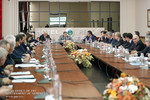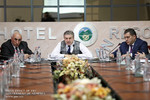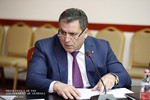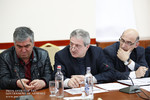Monday, 26 February 2018
PM Pleased with Tavush Marz Agriculture Development Indicators in 2017
On February 24, Prime Minister Karen Karapetyan traveled to Tavush Marz of Armenia to get acquainted with the activities and priorities implemented under regional and community development programs in 2017, as well as the tasks set for 2018.
Presenting Tavush Marz macroeconomic indicators, Governor Hovik Abovyan noted that there are 111,000 hectares of farmland in the Marz. As a result of community enlargement process, the number of communities was reduced to 24 from 62. Industrial gross output rose to AMD 13.7 billion in 2017 against 12 billion in 2016. Gross agricultural output was AMD 39.7 billion versus AMD 41.3 billion drams in 2016. The decline, according to the governor, was due to frosts and hailstones, as well as to the reduction of crop areas (5,000 hectares less than in 2016). Trade turnover made 33.5 billion drams against AMD 29.7 billion in 2016. The volume of services was 14.1 billion drams against the 10.7 billion stated in 2016. Construction totaled AMD 17.3 billion against 12.5 billion in 2016. Exports rose to 8 billion drams in 2017, twice as much as in 2016. The same was true with the level of investments, which stood at AMD 23.3 billion (800 jobs) against 10.1 billion drams (625 jobs) in 2016. It is planned to attract AMD 28.15 billion in investment this year and provide some 885 permanent jobs. Presenting the situation in the sphere of tourism, the Governor reported that 120,000 tourists visited the Marz in 2017, 25,000 more than in 2016. Tavush Marz is expected to host up to 135,000 tourists this year.
According to Hovik Abovyan, large-scale programs for establishment of greenhouse, fruit drying and refrigerating farms, intensive orchards and processing plants are being implemented in the agricultural sector. The number of such farms exceeds the total of 350, which provide more than 1,400 basic and temporary jobs. There are 6300 hectares of irrigated land in the province. 4740 hectares were irrigated in 2016, with 4757 hectares irrigated in 2017. This index is expected to increase up to 5290 hectares in 2018.
Fruit exports to Russia were as follows: 675 tons in 2016, and 1715 tons in 2017. It is projected to export up to 2700 tons in 2018. There are 1645 units of agricultural machinery in the region. 14 units of farm machinery have been purchased under the financial leasing program in 2016, 9 - in 2017. 24 units are due to be leased in 2018.
85 farmers received loans of 305.4 million drams under the program of subsidizing interest rates for agricultural loans. 25.3 hectares of fruit orchard and strawberry gardens were established in 2016. This figure increased by 44 hectares, making 69.7 hectares in 2017, while in 2018, it is projected to set up 350 hectares of intensive orchards in the region.
This year a considerable increase in the agricultural sector is expected. 2.8 billion dram-worth investment was made in 2017. 5.6 billion-worth investment is expected this year that may lead to 5-7% growth.
Pleased with the progress stated in agriculture, the Premier noted that much higher growth should be reported this year, given the current trends. No problems were reported in terms of purveyances. As to water supply, the WU Company responded in a timely manner, although there is still a problem of irrigation in the Marz.
Karen Karapetyan suggested considering the following scheme: if there are land plots (in whole or in part) that can be given to the potential investors with the right of ownership, provided that water supply is ensured, then it would be reasonable to hand over such plots of land.
Pleased with the 2017 achievements in agriculture, the Prime Minister urged those responsible to continue working at a higher pace.
It was reported that the share of personal income per capita in total revenues rose to 25.7% in 2017 against 22.2 percent in 2016. It is expected to reach the mark of 30.6% in 2018.
As for garbage collection and sanitation, 64 million drams were collected in 2017 against 55 million drams levied in 2016. It is envisaged to collect 96 million drams in 2018. Expenditures stood at AMD 232 million and AMD 278 million in 2016 and 2017 respectively, with 3030 million drams expected in 2018.
The Head of Government called the attention of those responsible to the blatant disproportion in expenditure-income ratio in Tavush Marz and instructed them to reconsider the planning approaches.
“Last year we were able to state quite a high growth rate nationwide. In 2016, we collected 800 million drams, subsidized 2.7 billion and spent 3.5 billion. This year we plan to collect 3.7 billion drams and spend 3.5 billion drams. We propose some indicative guidelines, but it is up to you to set up the tariffs. Your budget shall be limited, since you are increasing your expenses without ensuring adequate receipts. We will continue to provide subsidies not for spending on waste management, but for building up strategic assets. Look into the reasons behind expenditure rise in each community in order to understand why they keep growing,” the Prime Minister said, instructing the Governor to report back the findings to the Minister of Territorial Administration and Development.
In 2017, the total amount of paid services provided by 4 medical centers rose to 432.5 million drams against 353.4 million drams in 2016. In 2018, it is envisaged to increase this figure to AMD 507 million.
The Prime Minister stressed the importance health insurance. “We cannot have a good healthcare system without insurance. The State should have a clear-cut action plan. And if we set the right rules of the game – optimization, good functioning paid services, etc – all these issues will come out. Competition will get it right,” Karen Karapetyan underscored.
Coming to education, the Premier was told that robotics labs were established in 27 schools of Tavush Marz, mainly in rural communities; there is practically no lack of foreign language teachers. The demand is met by the Teach for Armenia program participants. Foreign languages are taught in all schools of the Marz; 7 schools are teaching a second foreign language. Entrepreneurship is being taught at high schools, which is quite effective.
With the support of the IDeA Foundation, a nationwide high-school business program (also in English) competition was organized in Dilijan, The Dilijan School won the competition, getting the opportunity to develop abilities abroad.
Appreciating the work done so far, the Prime Minister highlighted the need for providing comprehensive educational opportunities for children.
The meeting next discussed the following: effective management of property owned by communities, local and central authorities, construction permits and construction volume, non-standard solutions for rehabilitation of inter-community roads, Tavush Marz zoning and a number of other issues.












